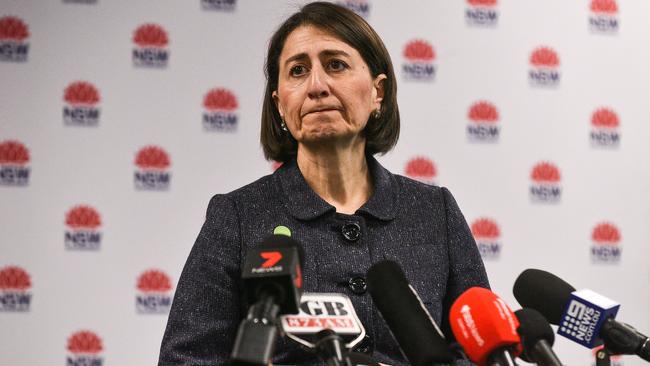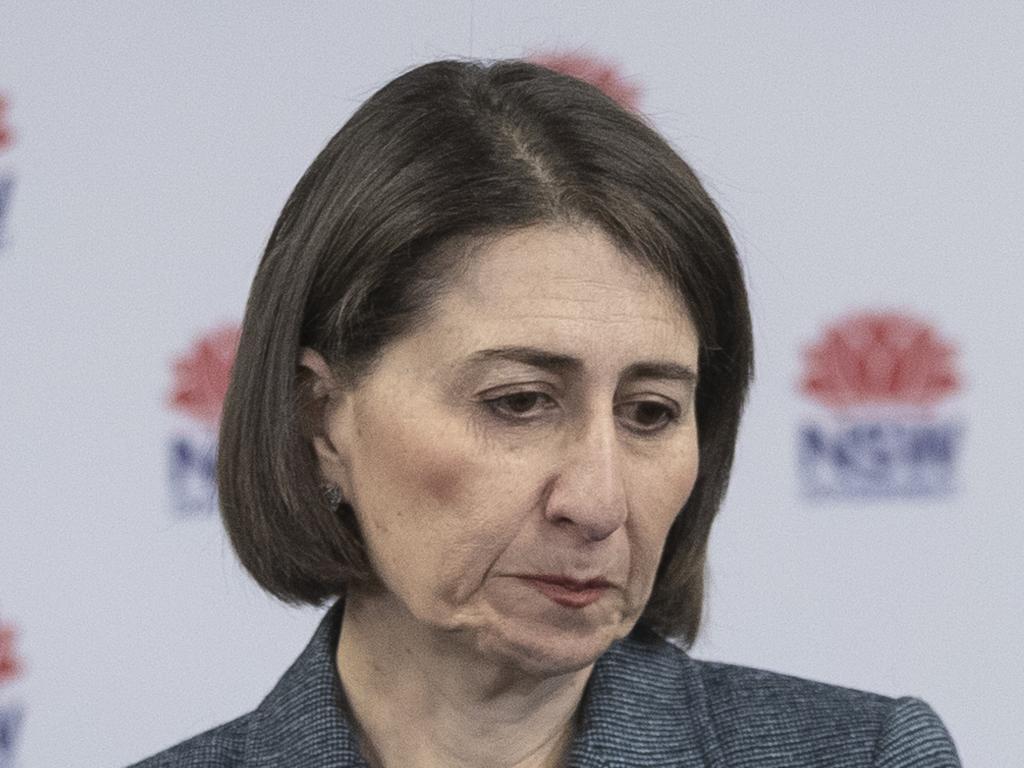Coronavirus errors: At least one politician knows how to say sorry

Even though she did not personally fail, NSW Premier Gladys Berejiklian accepted full responsibility for a debacle. She did not quibble with the report of a judicial inquiry she had set up into that debacle, which found that bureaucrats had made inexcusable and inexplicable errors in allowing passengers to disembark from the Ruby Princess in March with disastrous consequences. Instead she undertook to implement the recommendations, and then promised it would not happen again.
We can only hope it doesn’t, and the evidence since shows that Berejiklian and her government learned important lessons from the Ruby Princess disaster and have applied them. The main one is that when it comes to this virus there can be no slacking off, not for a moment.
NSW Health officials have responded like elite SWAT teams to outbreaks that have crossed from Victoria. The level of testing and contact tracing, described enviously as world class by medical experts in other jurisdictions, has been rapid and efficient, enabling the state to keep operating without harsh lockdowns.
It is a model other states and territories, with the help and urging of the federal government, need to follow if we are to have any hope of emerging from this catastrophe in reasonable shape.
If the New Zealand experience proves anything, it is that the virus cannot be eliminated. NSW is managing to contain it, showing how it is possible to live with it while keeping the economy and communities functioning as openly as possible until an effective vaccine emerges.
After facing criticism from Labor that it had moved too slowly, the federal government acted to secure a vaccine to cover all Australians. Morrison and health Minister Greg Hunt have gone all out to inspire hope at a time it is desperately needed. Morrison deluged the media on Wednesday to announce progress.
The least of this government’s problems is communicating a message, signalling an intention or selling an idea. Delivering is another matter altogether, and on the vaccine so much is out of its control, given the work that needs to be done to ensure its effectiveness and safety.
Cynics might suggest it is a good thing the government isn’t in charge of it, like they also might suggest the timing of the announcement is fortuitous with parliament (and another Newspoll) looming, and questions remaining about why it waited so long to respond to the threat to elderly in nursing homes — which they fund and regulate – from the second wave sparked by the failures in Victoria.
Not that there was any acceptance of fault by Morrison on Wednesday morning when ABC TV’s Michael Rowland asked him if the buck stopped with him on the aged-care failures. Morrison was back into glass jaw jutting mode, blaming the Victorians.
It is no wonder premiers and chief ministers largely ignore him and do exactly what they want in their fiefdoms, effectively rendering national cabinet meaningless.
They worked out long ago they get blamed when things go wrong, then Morrison gets the credit when they go well. When this assessment was put to him yesterday by Sky’s Andrew Clennell, Morrison protested it was unkind.
Unkind? Maybe. Untrue? Nah.
Despite Morrison pointing the finger of blame directly at the Andrews government for the aged-care disasters (only to step back hours later to say it was a “shared responsibility”), it was the federal government’s duty to develop a rapid-response plan months ago, particularly after 23 people died in Newmarch House and Dorothy Henderson Lodge in NSW in March and April. It still hasn’t been done. It is supposed to be signed off by the national cabinet on Friday.
Think about it. The number of cases in Victoria hit triple digits on July 4. On July 27, the day the Prime Minister flew to Queensland for a spot of campaigning (quickly aborted) the number had shot up to 549 and a total of 36 aged-care residents had died. Morrison and Hunt were still talking about dispatching emergency medical teams to help out.
Between January 22 and August 17, there were 1215 active cases in residential aged-care facilities, of which 49 had recovered and 228 had died, 197 of them in Victoria. No one seriously believes or expects that every one of those deaths could have been avoided. However, the question not properly answered is why it took so long for the Morrison government to act in an area it controls.
On July 29, the day before Victoria’s tally hit 732, Hunt said “aged care around the country has been immensely prepared”.
Peter Rozen QC, counsel assisting the aged-care royal commission, considered that to be an immense overstatement. Rozen has said 68 per cent of virus deaths were in aged care, and evidence would show this was one of the highest rates in the world. He said the sector was not properly prepared after the NSW outbreak and was not properly prepared now.
Responding to Rozen’s assertion that there was no specific plan for the aged-care sector, Morrison last Friday told Seven’s Mark Riley: “There has been a plan, Mark, and it has been updated and so we completely reject the assertion that there was not a plan because there was a plan.”
As if repetition would convince people there was one. Let’s accept there was one. It would have been obvious after two weeks or four weeks or six weeks as the toll climbed that it might be time for a new one, because Plan A was definitely not working.
Instead of taking Rozen’s remarks on board, or showing contrition and promising to do better, the response from the government was to deny, deflect, debunk and effectively seek to undermine its own inquiry.
Morrison claims to still have faith in the royal commission, but it remains unacceptable for a government to set up an independent inquiry to get to the truth of a matter then take issue with the uncomfortable truths it discovers.
Plan Bs on all fronts would be welcome right now. Inspire hope by all means, but be prepared — and upfront — about what happens if a vaccine never eventuates, or takes longer than expected to develop and distribute. Other than to blame someone else.





Something quite rare happened this week. A leader apologised repeatedly and unreservedly for mistakes that spread the coronavirus and cost lives. And it wasn’t Scott Morrison. Or Daniel Andrews.